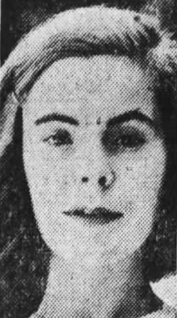Tina Flade
Tina Flade (9 March 1905 – 27 September 1997), born Albertine Flade, and later known as Tina Flade Mooney, was a German modern dancer. From 1934 to 1938, she taught dance at Mills College in California.
Early life
[edit]Flade was born in Dresden,[1] and trained as a pianist as a young woman.[2] She studied modern dance with Mary Wigman.[3][4]
Career
[edit]Flade performed with Wigman's concert group in Germany, Austria, and Switzerland.[5] She made her American debut in 1933, in New York; "she was gay, light, exuberant and altogether charming" recalled the New York Times' dance critic, John Martin.[3][6] She danced in Los Angeles later in 1933.[7][8] "There is a woodsy, faun-like loveliness", commented the Los Angeles Times critic. "She is filled with the joy of dancing and made her audience feel that dancing is a natural expression."[9]
In 1934, she was appointed head of the dance department at Mills College in California.[10][11] She developed her own dance compositions,[12] and gave a solo show at the Bennington School of the Dance in 1935.[13][14] In 1937 she taught modern dance at the Mills College Summer School,[15] and served on a committee to study modern dance for high school physical education classes.[16] She often collaborated with her Mills College colleague, composer and musician Henry Cowell.[17][18] She also worked with San Francisco-based composer Lou Harrison.[2][19] Among the dancers who studied with Flade were King Lan Chew[20] and choreographer Valerie Bettis.[21]
After marriage in 1938, she moved to Ohio, and taught classes for dance instructors at Ohio State University.[22]
Personal life
[edit]Flade married an American college professor, Ross Lawler Mooney, in 1938.[23] The Mooneys traveled to Israel in 1964, when Ross Mooney was a consultant to the Israeli Ministry of Education, and she taught in a children's cultural program in Jerusalem.[24] She was widowed in 1988, and died in Columbus, Ohio, in 1997, aged 92 years. She was buried at Union Cemetery, Franklin, Ohio.
There are interviews with Flade in the Dance Files of the Jerome Lawrence and Robert E. Lee Theatre Research Institute, Ohio State University.[25]
References
[edit]- ^ "Dance and Piano; Joint Program on Friday". San Francisco Examiner. 1935-05-05. p. 41. Retrieved 2020-04-09 – via Newspapers.com.
- ^ a b Saffle, Michael (2012-10-12). Perspectives on American Music, 1900–1950. Routledge. p. 222. ISBN 978-1-136-51979-6.
- ^ a b Martin, John (1935-07-21). "The Dance: Tina Flade Scores; Young German Dancer Reappears in the East After an Absence – Fokine Ballet at Stadium Tomorrow – News Notes". The New York Times. Retrieved 2020-04-09.
- ^ Mishnun, Virginia (1936-01-13). "The Dance; Tina Flade Performs at Guild Theater". The Brooklyn Daily Eagle. p. 11. Retrieved 2020-04-09 – via Newspapers.com.
- ^ Partsch-Bergsohn, Isa (1994). Modern Dance in Germany and the United States: Crosscurrents and Influences. Psychology Press. p. 100. ISBN 978-3-7186-5557-1.
- ^ "Critic Reviews Dance Program". Bennington Evening Banner. 1935-07-27. p. 5. Retrieved 2020-04-09 – via Newspapers.com.
- ^ "Recital Slated at Auditorium". Los Angeles Times. 1933-06-13. p. 27. Retrieved 2020-04-09 – via Newspapers.com.
- ^ Jones, Isabel Morse (1933-06-04). "Tina Flade is Aptly Named". Los Angeles Times. p. 31. Retrieved 2020-04-09 – via Newspapers.com.
- ^ Jones, Isabel Morse (1933-06-15). "Dance Concert Approved". Los Angeles Times. p. 11. Retrieved 2020-04-09.
- ^ Martin, John (1936-01-13). "Tina Flade Scores in Dance Progm; Second Career Begins in Most Promising Way for Former Wigman Troupe Artist. A Dancer of authority. Performance at Guild Theatre in Aid of Mills College, Where Miss Flade Teaches". The New York Times. Retrieved 2020-04-09.
- ^ "Miss Tina Flade to Dance Here Tomorrow". Reno Gazette-Journal. 1936-02-05. p. 2. Retrieved 2020-04-09 – via Newspapers.com.
- ^ "Tina Flade to Appear in Dances". Oakland Tribune. 1935-11-03. p. 27. Retrieved 2020-04-09 – via Newspapers.com.
- ^ McPherson, Elizabeth (2013-06-13). The Bennington School of the Dance: A History in Writings and Interviews. McFarland. pp. 47, 48. ISBN 978-1-4766-0295-0.
- ^ "Tina Flade Will Give Mills Dance-Recital in November". Oakland Tribune. 1935-10-21. p. 10. Retrieved 2020-04-09 – via Newspapers.com.
- ^ Cobb, Louise S. (May 1937). "Southwest District Association News". Journal of Health, Physical Education, and Recreation. 8 (5): 328. doi:10.1080/23267240.1937.10623577.
- ^ MacEwan, Charlotte G. (December 1937). "News from the Dance Section". Journal of Health, Physical Education, and Recreation. 8 (10): 627–628. doi:10.1080/23267240.1937.10623633.
- ^ Sachs, Joel (2012-07-09). Henry Cowell: A Man Made of Music. Oxford University Press. ISBN 978-0-19-993918-3.
- ^ Miller, Leta E. (2002). "Henry Cowell and Modern Dance: the Genesis of Elastic Form". American Music. 20 (1): 1–24. doi:10.2307/3052241. ISSN 0734-4392. JSTOR 3052241.
- ^ "Prélude pour piano (1937), Lou Harrison" (work details) (in French and English). IRCAM.
- ^ "Miss Chew to Present Dance". Green Bay Press-Gazette. 1939-03-18. p. 10. Retrieved 2020-04-09 – via Newspapers.com.
- ^ "Valerie Bettis papers". Jerome Robbins Dance Division. New York Public Library for the Performing Arts. Retrieved 2020-04-09.
- ^ Jewell, Margaret (May 1940). "News from the Dance Section". Journal of Health and Physical Education. 11 (5): 316–317. doi:10.1080/23267240.1940.10625910.
- ^ "Exchange Vows in Warren Co". Dayton Daily News. 1938-08-14. p. 22. Retrieved 2020-04-09 – via Newspapers.com.
- ^ "Circle to Hear Mrs. Mooney". The Newark Advocate. 1968-02-07. p. 34. Retrieved 2020-04-09 – via Newspapers.com.
- ^ Guide to the Dance Files, 1900–2014, Jerome Lawrence and Robert E. Lee Theatre Research Institute, Ohio State University.
External links
[edit]- "Reminiscences of Tina Flade 1979" (transcript and audio), interview by Theresa Bowers, 1 October 1979, Columbia Center for Oral History

